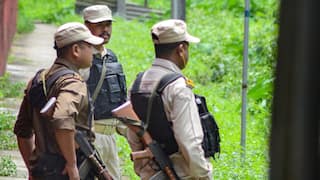Pablo Neruda Was Murdered, Claims Nephew Citing 'Forensic Report' 50 Years After Mysterious Death
Almost five decades after his mysterious death, forensics experts have now said that famous poet Pablo Neruda died of 'poisoning'.

Pablo Neruda Murder Mystery: Nobel Prize winner Chilean poet Pablo Neruda died in 1973 but the mystery of his death remained alive to date forcing government and agencies to probe the cause time and again in around a half-a-century time. And the long probe has proven that Pablo Neruda was murdered with poison, a fact that his driver argued for decades, reported the Associated Press.
Neruda's nephew Rodolfo Reyes said, "Neruda was murdered through the intervention of state agents in 1973," based on the forensics report finding he claims he has which suggests Neruda was indeed 'poisoned', reported AP.
The agency reported citing Reyes that forensic experts have determined that Chilean poet Pablo Neruda died of poisoning nearly 50 years ago.
Pablo Neruda’s Mysterious Death
The development is the latest in the chain of events of the great debates of post-coup Chile. Pablo Neruda died at the age of 69 in the chaos following Chile’s September 11, 1973 coup. He breathed his last on 23rd September 1973. The official position maintained that Neruda died of complications from prostate cancer but some suggested otherwise.
Neruda, who was best known for his love poems, was a friend of President Salvador Allende, who killed himself rather than surrender to troops during the coup led by Gen. Augusto Pinochet.
According to AP, Neruda was distressed by the military takeover and the persecution and killing of his friends. He planned to go into exile, where he would have been an influential voice against the dictatorship.
But a day before his planned departure, he was taken by ambulance to a clinic in Chile’s capital of Santiago where he had been treated for cancer and other ailments. Neruda later died there the same day on September 23, 1973, from natural causes. However, these ‘causes’ kept his death a matter of investigation for decades.
According to AP, suspicions that the dictatorship had a hand in the death remained long after Chile returned to democracy in 1990.
What The Forensics Report Says
According to a report in The Guardian, Neruda's nephew Reyes said on Monday that scientific tests had shown the toxin clostridium botulinum was present in his uncle’s body when he died, suggesting he was indeed “poisoned” in the aftermath of the coup.
Notably, the results of the expert analysis are due to be published in a report on Wednesday which has been conducted by forensic experts from Canada, Denmark and Chile.
AP reported that the public release of the group’s findings has been delayed twice this year, first due to internet connectivity issues of one of the experts and then again after a judge said the panel had yet to reach a consensus.
“We now know that there was no reason for the clostridium botulinum to have been there in his bones,” Reyes told the Spanish news agency Efe, reported The Guardian.
He added, “What does that mean? It means Neruda was murdered through the intervention of state agents in 1973.”
Reyes confirmed, as per the Guardian, that the bacteria, which produce the neurotoxin that causes botulism, were discovered on one of Neruda’s exhumed teeth in 2017. He said analysis by experts at McMaster University in Canada and the University of Copenhagen established the bacteria did not find their way into Neruda’s body from the coffin or the surrounding area.
In an interview with The Associated Press, Reyes said forensic tests carried out in Danish and Canadian labs indicated a presence of “a great quantity of Cloristridium botulinum, which is incompatible with human life.”
The powerful toxin can cause paralysis in the nervous system and death, AP reported.
Reyes, who is also a lawyer in the judicial case over his uncle’s death, said he has access to the forensic report. As per the report, the forensic probe was carried out after the same group of experts said in 2017 that there were indications of a toxin in the late poet’s bones and a molar.
The lab tests concluded that the toxin was administered when the poet was alive, Reyes said as quoted by AP.
The report, however, is set to be released almost 50 years after the death of the poet and Communist Party member and 12 years after the start of a judicial investigation into whether he was poisoned, as his driver Manuel Araya maintained all these years.
Araya told AP earlier this month he was confident that the forensic findings would support his assertion the poet died after being given “an injection in the stomach” at the clinic where he was hospitalised. Araya said that he first heard that version of events from a nurse.
Previous Investigations Into His Death
In the years after Neruda’s death, much of the focus has been on locating a mysterious “Dr. Price” who was claimed to be on duty at the clinic the night the poet died, reported The Guardian. However, there was no mention of the doctor in the records of Chile’s medical union, and it was eventually deduced that he had been invented to stall investigations, the report further said.
As part of the probe, international forensics experts several years ago rejected the official cause of death as cachexia, or weakness and wasting of the body due to chronic illness — in this case cancer. But at that time, they said they had not determined what killed Neruda.
Then in 2013, Neruda’s body was exhumed to determine the cause of his death, but those tests showed no toxic agents or poisons in his bone. But his family and driver demanded further investigation.
In 2015, Chile’s government said it was “highly probable that a third party” was responsible for Neruda’s death. Neruda’s body was reburied in his favorite home overlooking the Pacific Coast last year.
Then in 2017, a team of international scientists rejected the official cause of death and said that Neruda did not die of cancer or malnutrition, but they did not say anything on what he did die of.
“The fundamental conclusions are the invalidity of the death certificate when it comes to cachexia as a cause of death,” Aurelio Luna, one of the panel’s experts, said at that time, as quoted by AP.
“We still can’t exclude nor affirm the natural or violent cause of Pablo Neruda’s death,” Luna added.
The former Mexican ambassador to Chile at the time of the bloody military coup, Gonzalo Martínez Corbalá, told AP on two occasions that he saw Neruda the day before his death and that his body weight was close to 100 kilos (220 pounds). Martínez spoke to AP by phone in 2017, a few days before his death.
Neruda’s driver Araya told AP last month he still thinks that if Neruda “hadn’t been left alone in the clinic, they wouldn’t have killed him.”
As per the AP‘s report, Araya recalled that on Neruda’s instructions, on Sunday, September 23, the poet’s wife, Matilde Urrutia, and he were at the mansion to pick up the suitcases that would be taken to Mexico the following day. In the middle of the afternoon Neruda asked them to come back quickly. He died that same night.
Pablo Neruda’s Life
Like his death, the life of Pablo Neruda was circled by several controversies, however, none could diminish his work and status therein. During his life, Neruda accumulated dozens of prizes, including the 1971 Nobel Prize for Literature.
But incidents like criticism from feminist groups over a rape he committed in the 1930s and which he recounted in his book “I Confess That I Have Lived” continues to deliver a controversial image of his. AP mentioned that he is criticised for abandoning his only daughter, Malva Marina, because she was born with hydrocephalus.
Related Video
Breaking News: BJP’s New National President Pays Tribute to Party Workers and Leadership







































